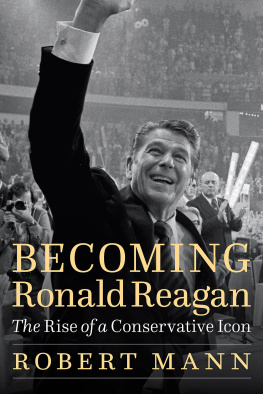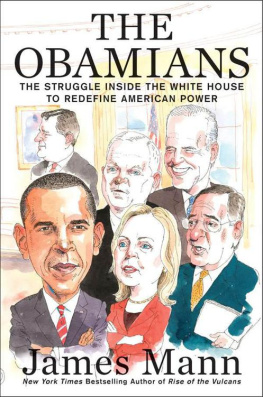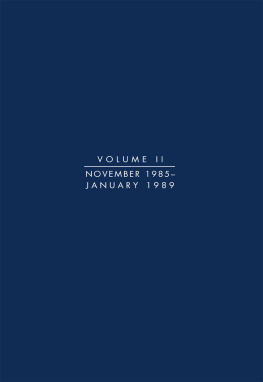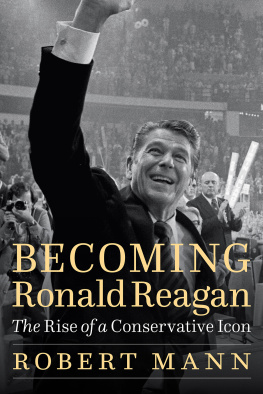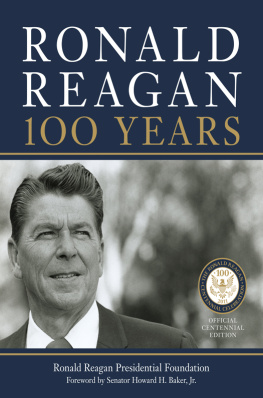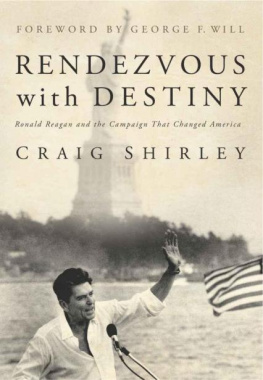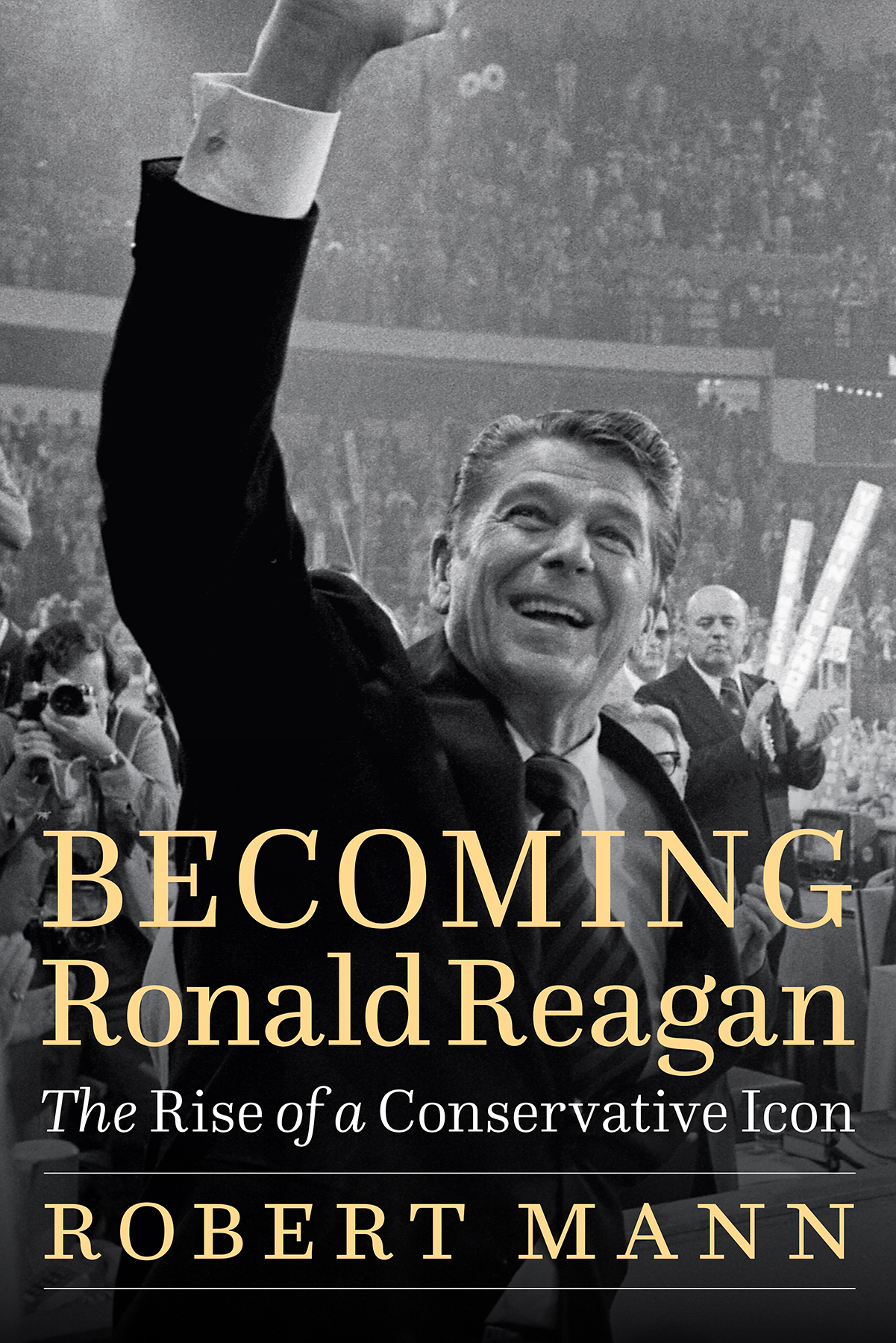
This typically excellent, highly original work from Robert Mann will emerge as the standard interpretation of Reagans ideological evolutionand his development as a major political figure. Mann stresses both continuity in Reagans belief system and recognition of the pre-gubernatorial eras importance. A must-read.
Robert David Johnson, professor of history at Brooklyn College and the City University of New York Graduate Center and author of All the Way with LBJ: The 1964 Presidential Election
Ronald Reagan took one of the most unconventional paths to the presidency in American history. Robert Mann tells this part of Reagans remarkable story in lively, enlightening prose. Ronald Reagan evolved from rags to riches, liberal to conservative, and Democratic to Republican. But as Mann masterfully shows, Reagans innate talents and personal genuineness were evident at each stage of his transformation into an icon who will never ride into the sunset for conservatives.
Larry J. Sabato, director of the Center for Politics at the University of Virginia and author of The Kennedy Half-Century
With empathy and critical insight, Robert Mann guides us on a journey through Ronald Reagans personal and political awakening. Anyone who wishes to understand the roots of modern conservatism will profit from this engaging and deeply researched study of Reagans ideological evolution from New Deal liberal to right-wing warrior. Love or loathe him, this book will help you understand him.
Joshua M. Zeitz, author of Building the Great Society: Inside Lyndon Johnsons White House
Becoming Ronald Reagan
The Rise of a Conservative Icon
Robert Mann
Potomac Books
An imprint of the University of Nebraska Press
2019 by Robert Mann
Cover designed by University of Nebraska Press; cover image courtesy of the Gerald R. Ford Presidential Library.
Author photo by Avery Mann.
All rights reserved. Potomac Books is an imprint of the University of Nebraska Press.
Library of Congress Cataloging-in-Publication Data
Names: Mann, Robert, 1958 author.
Title: Becoming Ronald Reagan: the rise of a conservative icon / Robert Mann.
Description: Lincoln: Potomac Books, an imprint of the University of Nebraska Press, 2019.
Includes bibliographical references and index.
Identifiers: LCCN 2019008146
ISBN 9781612349688 (cloth: alk. paper)
ISBN 9781640122536 (epub)
ISBN 9781640122543 (mobi)
ISBN 9781640122550 (pdf)
Subjects: LCSH : Reagan, Ronald. | Reagan, RonaldChildhood and youth. | Motion picture actors and actressesUnited StatesBiography. | GovernorsCaliforniaBiography. | Dixon (Ill.)Biography.
Classification: LCC E 877 . M 35 2019 | DDC 973.927092 [B]dc23
LC record available at https://lccn.loc.gov/2019008146
The publisher does not have any control over and does not assume any responsibility for author or third-party websites or their content.
For Dave Norris, my teacher, mentor, and friend
Contents
I am grateful for the kindness, sharp eyes, and honesty of those who read this manuscript in whole or in part: Bob Ritter, Alisa Plant, Louis Day, Glo Weaver, Norman Sherman, John OBrien, and Jay Shelledy. I appreciate the incisive, helpful review by the anonymous reader for Potomac Books, as well as the careful copyediting of Elaine Durham Otto. The staffs at several archival collections were most helpful and hospitable during my research. Those include the Arizona Historical Foundation at the Arizona State University Library; the David M. Rubenstein Rare Book and Manuscript Library at Duke University; the Department of Special Collections at the University of California Santa Barbara; the Kislak Center for Special Collections at the University of Pennsylvania; the Ronald Reagan Presidential Library; the Briscoe Center for American History at the University of Texas at Austin; and the Vanderbilt TV News Archive at Vanderbilt University.
Thanks to Valerie Yaros, historian/archivist for the Screen Actors GuildAmerican Federation of Television and Radio Artists, for her assistance. For decades, the LSU Middleton Library has been a second home where I conduct my research. I am grateful to the librarys dedicated staff members, led by Dean Stanley Wilder, for their assistance. I especially appreciate the help of the librarys interlibrary loan section and mass communication librarian, Rebecca Kelley.
Thanks also to the following individuals: Alisa Plant, who is not only a remarkable and wise editor but also a good friend; Sheridan Wall, my industrious and resourceful student researcher; the Manship family, who established the endowed chair that provided so much of the funding for my research; Dean Martin Johnson, former dean Jerry Ceppos, and other wonderful and gifted colleagues on the faculty and staff of the Manship School of Mass Communication at Louisiana State University; my students, who inspire me; Dean Jonathan Earle and others at the LSU Roger Hadfield Ogden Honors College for their support of my teaching and research; and Bill Geerhart, whose long fascination with Ronald Reagans famous October 27, 1964, speech inspired me to tell this story. (Bill has an outstanding website dedicated to the speech at http://conelrad.blogspot.com/2014/10/a-time-for-credit-men-who-put-reagan-on.html.)
I dedicate this book to Dave Norris, my economics professor at the University of LouisianaMonroe more than forty years ago and a treasured friend and mentor in the years since. As mayor of West Monroe, Louisiana, for four decades, Dave was one of the most respected and gifted public officials in my state. He now enjoys a well-earned retirement from elected office. I attribute much of who I am and how I view the world to the friendship and guidance of wise and caring mentors like Dave.
More than thirty years ago, as I began writing books, I worked for U.S. senator John Breaux of Louisiana. When Breaux learned I wanted to write a biography about his Senate predecessor, Russell B. Long, he instantly became my cheerleader and remained so through my first three books, giving me the time and space to research and write while keeping me on his staff part-time. I can imagine few political leaders who would have been so supportive of a staffer who wanted to write books on the side. Breauxs encouragement and friendship made all the difference in my budding writing career, and that paved the way for my rewarding years in academia. Regarding academia, I owe an enormous debt of gratitude to my former dean and current faculty colleague at LSU , John Maxwell Hamilton, who supported hiring me in 2006. I will never be able to thank Jack enough for what he has done for me and for the students, faculty, and staff of the Manship School.
Finally, I am thankful for my wise and loving wife, Cindy, who supports and encourages me in everything I do, and for our daughter and son, Avery and Robert. I love the three of you more than life itself.
In the spring of 1954, Ronald Reagan was a washed-up Hollywood actor with few prospects for reviving a film career that had never delivered the stardom he desired. Early that year, Reagan was nearly broke. In desperation, he had agreed to a humiliating two-week stint as the master of ceremonies for a music-and-comedy revue at a Las Vegas hotel and casino. It seemed his once-promising career in entertainment was almost over. By late summer, however, Reagans fortunes had changed. General Electric hired him to host a weekly television drama series it sponsored on CBS and gave him the side job of goodwill ambassador for the manufacturing giant. The show was a hit. Overnight he was a star again.
Next page
